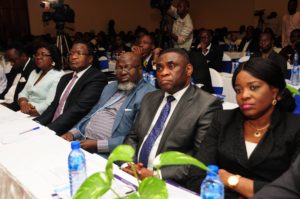By OLUWATOBI OPUSUNJU/Lagos

(L-R): Mr. Felix Adeoye, Director/ Commission Secretary, Nigerian Communications Commission (NCC); Prof. Umar Garba Danbatta, Executive Vice Chairman, Nigerian Communications Commission (NCC); Barr. Adebayo Shittu, Honorable Minister of Communications during the Corporate Governance Forum on the 21st of June, 2016 at the Sheraton Hotel, Ikeja, Lagos. — at Sheraton Lagos Hotel.
The Nigerian Communications Commission (NCC) has announced plans to begin to enforce compliance to the Corporate Governance Code by business entities operating within the telecom sector and under its regulatory ambience. This move underscores the regulator’s desire to instill stricter corporate discipline among operators as it tries to sustain Nigeria’s telecom growth in a country struggling with economic downturns.
The pronouncement was made today in Lagos by the Executive Vice Chairman (EVC) of the NCC, Prof. Umar Garba Danbatta at the Corporate Governance Forum on the Review of the Industry Code. The forum was formally opened by the Honorable Minister of Communications, Barr. Adebayo Shittu.
Danbatta highlighted the importance of implementing a Code of Corporate Governance for the ICT and Telecoms sector. He said the telecommunications sector has attracted Foreign Direct Investments (FDI) in excess of $38 billion, while its value chain has led to the creation of a significant number of jobs opportunities for the young Nigerians.
He noted that in the first quarter of 2016, the telecoms sector contributed in progressive and real terms, about 8.83% to the Country’s Gross Domestic Product (GDP), which represents an increase of 0.5% from the last quarter of 2015.
What this means is that adherence to the Corporate Governance Code has become exigent to maintaining a healthy growth in the sector.
His words: “In recognition of the need to sustain the phenomenal success recorded in the industry ad replicate the lessons learnt in other sectors that had gone through the ‘boom and bust’ cycle, the Commission in 2012 set up a multi-stakeholder Corporate Governance Working Group (CGWG) with membership drawn from across Nigerian telecoms industry, the Commission and the Corporate Governance practitioners.
“The mandate of the Group was to determine the industry’s corporate governance needs and the best approach to be adoptedin addressing them. The CCWG developed the Code of Corporate Governance for the telecoms industry which was published in 2014.”
“The Code has expanded the frontiers of accountability in the operation of companies in the sector. The Code is declaratory in nature and implementation was initially voluntary across industry, leading to violations.
“[But] now, the “Commission is gradually moving towards stricter compliance. To this end, the Commission recently carried out an industry study to assess the level of compliance with the Code.”

(L-R):Director, Policy Competition and Economic Analysis, NCC, Ms. Josephine Amuwa; Executive Vice Chairman, NCC, Prof. Umar Garba Danbatta; Honorable Minister of Communications, Barr. Adebayo Shittu; Director, Public Affairs, NCC, Mr. Tony Ojobo; Director, Special Duties, NCC, Mrs. Iyabo Sholanke — with Tony Ojobo at Sheraton Lagos Hotel.
The Commission in 2012 set up a multi-stakeholder Corporate Governance Working Group (CGWG) with membership drawn from across the Nigerian telecoms industry, the Commission and Corporate Governance practitioners. The mandate of the Group was to determine the industry’s corporate governance needs and the best approach to be adopted in addressing them. The CGWG developed the Code of Corporate Governance for the telecoms industry, which was published in 2014.
The Code consists of 12 principles and was developed to protect the interest of investors and stakeholders in the industry, as well as promote time-valued principles of accountability, responsibility, transparency, integrity and ethical conduct.
While compliance with the provisions of the industry Code was initially made voluntary for a period of one year, which has since lapsed, the Commission is gradually moving towards a regime of stricter compliance.

































